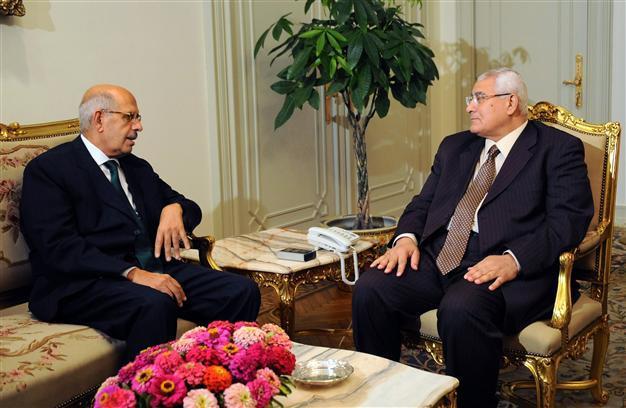Dispute over PM snags Egypt as tension persists
CAIRO

A handout picture released by the Egyptian Presidency shows Egypt's interim president Adly Mansour (R) meeting with newly appointed Prime Minister and opposition National Salvation Front leader Mohamed ElBaradei (L) in Cairo on July 6. AFP photo / Egyptian Presidency
Egypt’s political transition after President Mohamed Morsi’s ouster by the military has stumbled at the first hurdle, as the choice of liberal politician Mohamed ElBaradei as interim prime minister was thrown into doubt by objections.
Morsi’s Muslim Brotherhood movement called for further protests on July 7 after dozens of people were killed and more than 1,000 wounded on July 5 in clashes between his supporters, opponents and the military. Tamarod, the grassroots movement that organized the mass protests against Morsi, also called for new demonstrations to counter the Islamists, raising fears of more unrest.
ElBaradei’s nomination had been confirmed by several sources and state media on July 6, but just before midnight a presidential spokesman told reporters that the prime minister had not in fact been chosen. Presidential adviser Ahmed al-Muslimani said ElBaradei, the former head of the U.N. nuclear watchdog, remained the “strongest candidate.”
“He is on top of the list of names,” Muslimani told Agence France-Presse.
The abrupt U-turn came amid opposition to the appointment by the Salafi al-Nour Party, Egypt’s second Islamist force after the Brotherhood, highlighting the challenge the military faces in finding consensus among liberals and conservatives on who should run the country.
Two reasons for rejection“Our position is simple. There are two reasons to reject ElBaradei: We need a technocratic economic figure and we need to end polarization on the street,” said Nader Bakkar, a senior politician from the al-Nour party. “We can’t talk of national reconciliation and then make Morsi’s most ardent opponent prime minister,” he said. The al-Nour Party had agreed to the army-backed transition plan leading to new elections.
An official close to ElBaradei conceded there were fears of alienating al-Nour, which won almost a quarter of votes in a 2011 parliamentary election, and “driving them” into Morsi’s Muslim Brotherhood camp. Following the al-Nour rejection, the interim administration headed by Adli Mansour delayed naming the new prime minister. Meanwhile, the presidency held out an olive branch to Morsi supporters in the Brotherhood, as its leaders vowed to press protests rejecting his ouster.
“We extend our hand to everyone. Everyone is a part of this nation,” Muslimani said. ElBaradei also called for the Brotherhood to be included in Egypt’s political future, in a media interview conducted before his candidacy as interim premier hit opposition. The Brotherhood has said it wants nothing to do with the military’s plans for a new interim government. It wants Morsi reinstated and has pledged to keep protesting until he is.
ElBaradei told German news weekly Der Spiegel in remarks published yesterday that members of the Muslim Brotherhood camp of ousted President Mohamed Morsi should not be treated as criminals.
Pipeline with Jordan bombed“I am calling for inclusion of the Brotherhood in the democratization process,” he said in comments printed in German. “No one should be taken to court without a convincing reason. Former President Morsi must be treated with dignity,” he added, calling such principles “preconditions for national reconciliation.”
Meanwhile, militants in Egypt’s Sinai Peninsula yesterday bombed a gas pipeline to Jordan, witnesses said, amid a surge in attacks on police and soldiers since Morsi’s ouster. The blast took place near the North Sinai provincial capital of El-Arish, scene of major disturbances since Morsi’s overthrow. A Jordanian government official confirmed that gas supplies to the energy-poor kingdom were cut.
“The gas supplies to Jordan stopped due to the attack,” the official told state-run Petra news agency.
Egyptian gas covers 80 percent of electricity generation in Jordan, which imports 95 percent of its energy needs.
